Scattered fighting flared in northern Syria on Friday despite a ceasefire deal as Turkish President Recep Tayyip Erdogan warned he would resume a full-scale operation against Kurdish forces if they do not withdraw from a border "safe zone."
"If the promises are kept until Tuesday evening, the safe zone issue will be resolved," Erdogan told reporters after Friday prayers in Istanbul. "If it fails, the operation... will start the minute 120 hours are over."
The truce, announced by U.S. Vice President Mike Pence after talks in Ankara with Erdogan, sets out a five-day pause to let the Kurdish-led Syrian Democratic Forces (SDF) militia pull out of the Turkish "safe zone."
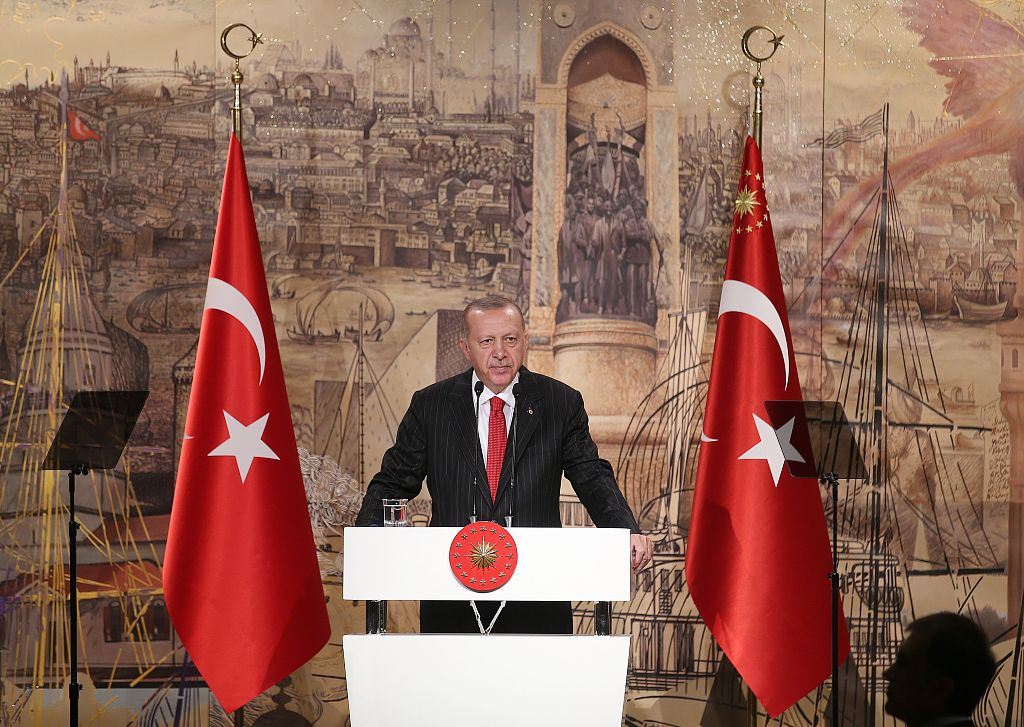
Turkish President Tayyip Erdogan talking to media in Istanbul on October 18, 2019. /VCG Photo
Turkish President Tayyip Erdogan talking to media in Istanbul on October 18, 2019. /VCG Photo
"As of now, the 120-hour period is on. In this 120-hour period, the terrorist organization, the YPG, will leave the area we identified as a safe zone," Erdogan told reporters, adding that the safe zone would be 32 km deep, and run "440 km from the very west to the east."
But the U.S. special envoy for Syria, James Jeffrey, said the accord covered a smaller area where Turkish forces and their Syrian rebel allies were fighting, between the two border towns of Ras al Ain and Tel Abyad, just 120 km away.
U.S. President Donald Trump said on Friday he had spoken with Erdogan who told him there had been some "minor" sniper and mortar fire in northeastern Syria despite the truce, but that it had been quickly eliminated.
"He very much wants the ceasefire, or pause, to work," Trump said in a post on Twitter. "Likewise, the Kurds want it, and the ultimate solution, to happen."
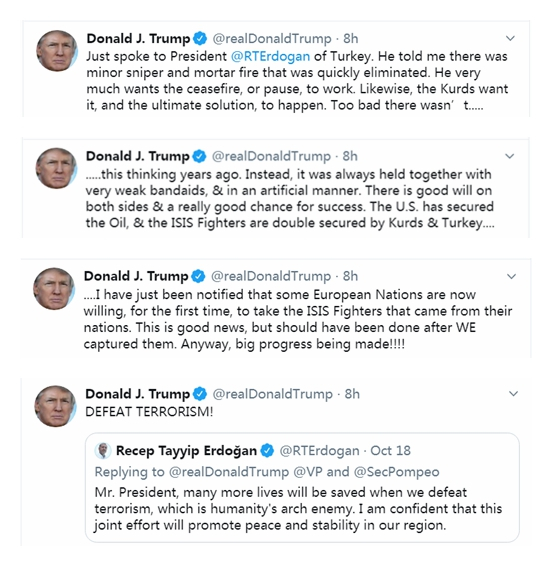
Mustefa Bali, a spokesman for the Kurdish Syrian Democratic Forces (SDF), accused Turkey, however, of violating the ceasefire deal reached during the visit to Ankara on Thursday by U.S. Vice President Mike Pence.
"Despite the agreement to halt the fighting, air and artillery attacks continue to target the positions of fighters, civilian settlements and the hospital" in the battleground border town of Ras al-Ain in northeastern Syria, he said.
But Reuters journalists at the border said the bombardment subsided around mid-morning and a U.S. official said most of the fighting had stopped, although it would "take time for things to completely quiet down."
The UN Office for the Coordination of Humanitarian Affairs reported that the situation is calm in most areas, with the exception of Ras al-Ain in al-Hasakah governorate, where shelling and gunfire continued to be reported earlier Friday, said U.N. spokesman Stephane Dujarric.
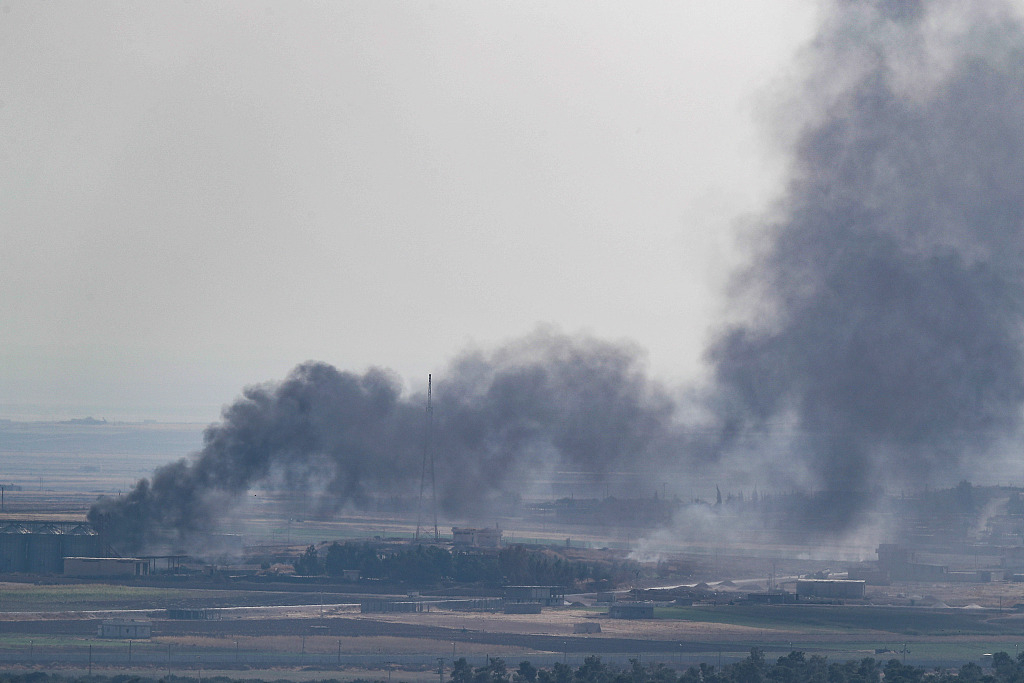
Smoke rises over the Syrian town of Ras al-Ain, as seen from the Turkish border town in Ceylanpinar, Turkey on October 18, 2019. /VCG Photo
Smoke rises over the Syrian town of Ras al-Ain, as seen from the Turkish border town in Ceylanpinar, Turkey on October 18, 2019. /VCG Photo
Mitch McConnell attacks Trump
In Washington, U.S. senators who have criticized the Trump administration for failing to prevent the Turkish assault said they would press ahead with legislation to impose sanctions against Turkey.
Senate Majority Leader Mitch McConnell wrote in an op-ed in the Washington Post that the withdrawal of U.S. forces from Syria was "a grave strategic mistake."
"The combination of a U.S. pullback and the escalating Turkish-Kurdish hostilities is creating a strategic nightmare for our country," he wrote.
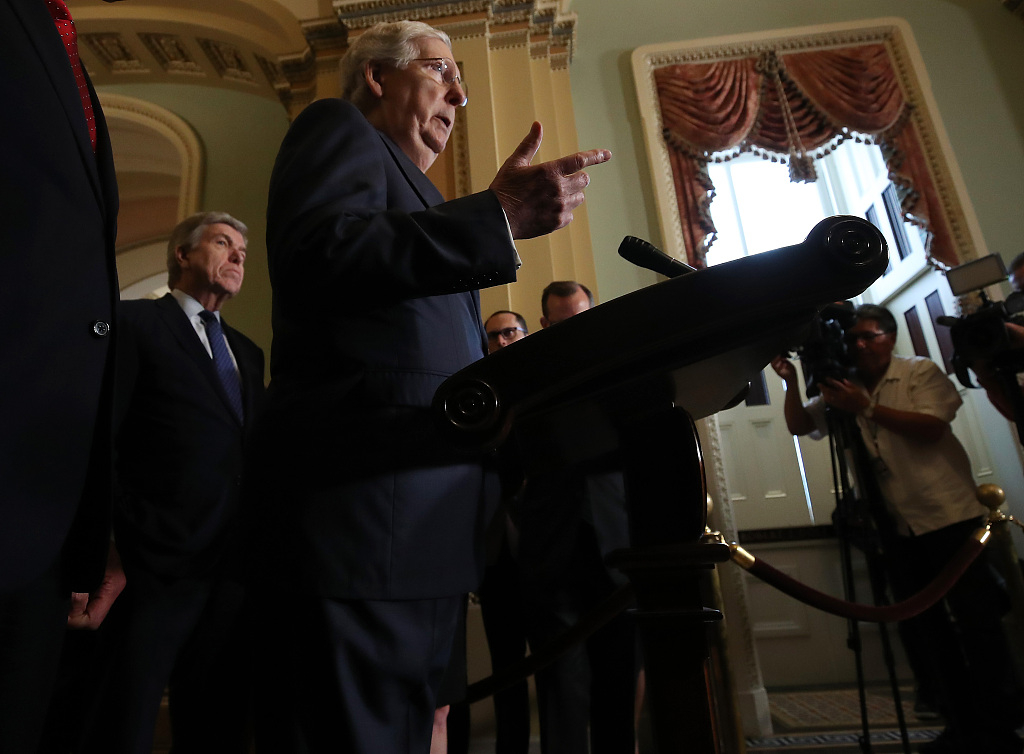
Senate Majority Leader Mitch McConnell (R-KY) speaks to the media after attending the Republican weekly policy luncheon on Capitol Hill, Washington, U.S., on July 23, 2019. /VCG Photo
Senate Majority Leader Mitch McConnell (R-KY) speaks to the media after attending the Republican weekly policy luncheon on Capitol Hill, Washington, U.S., on July 23, 2019. /VCG Photo
The joint U.S.-Turkish statement released after Thursday's talks said Washington and Ankara would cooperate on handling ISIL fighters and family members held in prisons and camps - an important international concern.
Pence said U.S. sanctions imposed on Tuesday would be lifted once the ceasefire became permanent.
McConnell also warned that a U.S. "retreat" will allow both Russian and Iranian influence to grow in the region.
The government of Syrian President Bashar al-Assad, backed by Moscow and Tehran, has already taken up positions in territory formerly protected by Washington, invited by the Kurds.
Jeffrey acknowledged that Turkey was now negotiating with Moscow and Damascus over control of areas that Washington was vacating and were not covered by the U.S.-Turkish truce pact.
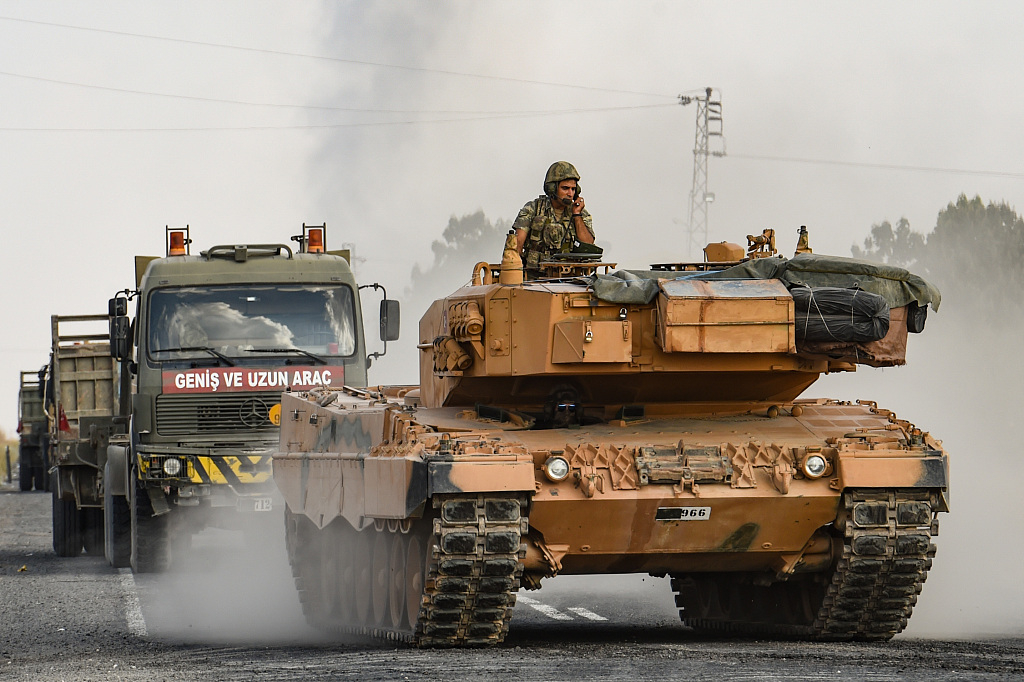
A Turkish army tank moves towards the Syrian border in Ceylanpinar, Turkey, on October 18, 2019. /VCG Photo
A Turkish army tank moves towards the Syrian border in Ceylanpinar, Turkey, on October 18, 2019. /VCG Photo
"As you know we have a very convoluted situation now with Russian, Syrian army, Turkish, American, SDF and some Daesh elements all floating around in a very wild way," Jeffrey said.
"Now, the Turks have their own discussions going on with the Russians and the Syrians in other areas of the northeast and in Manbij to the west of the Euphrates. Whether they incorporate that later into a Turkish-controlled safe zone, it was not discussed in any detail."
In Brussels on Friday night at NATO headquarters, U.S. Secretary of State Mike Pompeo said, "we also saw some very positive activity - the beginning of a coordination that will be required so that there can in fact be a safe withdrawal of the YPG fighters that are inside the Turkish-controlled area that is covered by the agreement."
NATO Secretary General Jens Stoltenberg emphasized that northern Syria was of concern and matters to all NATO allies.
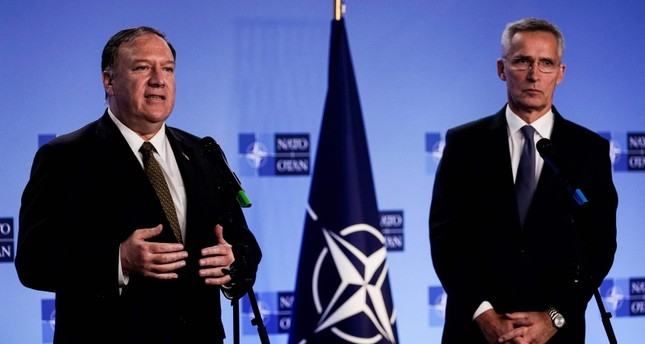
U.S. Secretary of State Mike Pompeo (L) gestures as he delivers a speech during a joint press conference with NATO Secretary General Jens Stoltenberg following their meeting in Brussels, on October 18, 2019. /AFP Photo
U.S. Secretary of State Mike Pompeo (L) gestures as he delivers a speech during a joint press conference with NATO Secretary General Jens Stoltenberg following their meeting in Brussels, on October 18, 2019. /AFP Photo
"We all understand that we have a common enemy - Daesh (ISIL)," Stoltenberg said, using another name for the ISIL. "We must not jeopardize the gains we have made in the fight against our common enemy Daesh (ISIL)."
NATO defense ministers would address the issue when they meet next week, Stoltenberg said.
A U.S. defense official, speaking on condition of anonymity, said the U.S. would continue aerial surveillance in northeastern Syria to monitor prisons holding ISIL militants.
(With input from agencies)